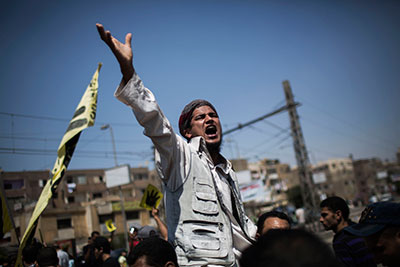New York, August 30, 2013–Egyptian security forces continue to detain and harass journalists working for news outlets critical of the military-led government, particularly Al-Jazeera and its affiliates. Journalists also still face physical threats from protesters, as tensions persist between the government and supporters of ousted President Mohamed Morsi.
“The Egyptian government is widening its censorship campaign against critical media in Egypt to undermine coverage of Muslim Brotherhood protests,” said Sherif Mansour CPJ’s Middle East and North Africa coordinator. “Like their predecessors, authorities apparently fail to grasp that the attempted suppression of dissenting voices only compounds the dissent.”
The Ministry of Investment on Thursday said it would ban Al-Jazeera Mubashir, the network’s Egyptian affiliate, because it lacked the required legal permits, according to news reports. The statement accused the channel of “spreading lies and rumors damaging to Egyptian national security and unity.” Today, the Ministry of Interior issued a statement saying it had confiscated two broadcasting cars and equipment from Al-Jazeera Mubashir.
On Tuesday, Egyptian security forces detained without charge four staff of Al-Jazeera English, including correspondent Wayne Hay, cameraman Adil Bradlow, and producers Russ Finn and Baher Mohammed, the station reported. Al-Jazeera Arabic correspondent Abdullah al-Shami and Al-Jazeera Mubashir cameraman Mohamed Bader had been arrested earlier this month while covering protests and held under charges of “threatening national security” and “possessing weapons,” respectively.
Six of the 10 journalists in custody in Egypt are from Al-Jazeera and its affiliates, according to CPJ research.
Al-Jazeera Mubashir’s office was raided and shut down on July 3, shortly after the military announced Morsi’s removal. Its sister channel, Al-Jazeera Arabic, was raided in mid-August and shut down. Both stations continue to broadcast from Qatar with feeds from inside Egypt.
Also this week, security forces raided Hamas affiliated Al-Aqsa TV’s office in Cairo on Thursday, confiscating equipment and closing the office, according to the station and news reports. Office director Ahmed Sobea said on his Facebook page the same day that there were no employees in the office at the time. He vowed to take legal action to reopen it.
Security forces also visited the offices of Turkey’s Anadolu News Agency in Cairo to check on its registration and accreditation papers. They left without making arrests or confiscating equipment, according to news reports. The Cairo bureau chief of Turkish news agency Ihlas, Tahir Osman Hamde, who had been arrested on August 20, has since been released.
On Sunday, correspondent Marcin Mamoń, of the Polish daily Rzeczpospolita, and his interpreter Przemysław Marek Szewczyk were detained for two days by Egyptian police for breaking the curfew in Alexandria, according to news reports.
Separately, Muslim Brotherhood supporters attacked a crew from the local ONTV station in Nasr City neighborhood in Cairo as they covered “Friday of Determination” protests against the government, according to the station and news reports. The demonstrators confiscated and broke the channel’s equipment and tore the crew’s clothing.
Last week, Muslim Brotherhood supporters at a pro-Morsi protest detained five employees of Al-Mehwar TV station in Helwan, south of Cairo, for several hours and forced the crew to broadcast them making pro-Morsi statements before Egyptian police arrested them, according to news sources.
Since the military ousted Morsi on July 3, CPJ has documented, in addition to 10 journalists in detention, the killings of five journalists, nine raids on news organizations, and at least 64 cases of temporary detentions, assaults, and confiscations.
- For more data and analysis, visit CPJ’s Egypt page.
